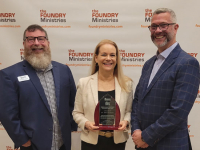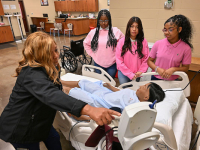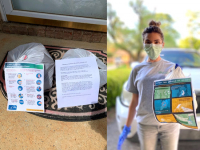
By Pareasa Rahimi
In 2013, an innovative collaboration between the University of Alabama at Birmingham School of Nursing and Children’s of Alabama established the Clinical Scholars initiative, a year-long program focusing on building leadership capacity among Children’s of Alabama nurses and health care professionals and the enhancement of quality care in clinical practice.
In the past decade, 10 cohorts of nurses totaling 132 participants, have completed the program that includes a comprehensive in-person curriculum designed to cultivate nurses’ expertise in quality improvement and leadership, aligning their skills with the evolving demands of contemporary health care settings. The program helps participants hone the abilities essential for steering teams, guiding initiatives and spearheading quality improvement endeavors.
Participants form teams early in the program based on similar areas of interest for improvement initiatives, working to identify gaps in practice within their clinical locations and develop quality improvement initiatives. For example, a team of participants identified nurse burnout within a unit and initiated a project providing additional resources, training and burnout recognition among providers. This project has resulted in improved provider engagement, less burnout and an open platform for communication.
The Clinical Scholars Initiative is co-directed by Associate Professor and Assistant Dean for Graduate Clinical Education – MSN Tedra Smith, DNP, CRNP, CPNP-PC, CNE, CHSE (MSN 2004, DNP 2011), and Associate Professor and Assistant Dean for Graduate Clinical Education – DNP and other Pathways Curry Bordelon, III, DNP, MBA, CNE, NNP-BC, CPNP-AC (DNP 2016).
“For these nurses, the Scholars Initiative is a transformative journey where knowledge meets practice with a focus on cultivating bedside nurse leaders who aspire to elevate health care through evidence-based excellence,” Smith said.
With success has come significant expansion over the past decade. The initiative has always embraced interprofessional collaboration, and over the years has expanded beyond nursing to welcome other health care professionals as participants, enriching the experience with varied perspectives. Since the program’s launch, participation has grown from three scholars in the first cohort to approximately 18-22 participants in subsequent cohorts.
Recognizing the multifaceted nature of leadership and career mobility, the curriculum also has evolved to include developing curriculum vitae, honing interview skills and navigating crucial conversations. More recently, enhancements to the program’s curriculum include interprofessional engagement with child life specialists, shadowing opportunities, as well as the addition of leadership in quality improvement, tabletop simulations and role play activities to enhance the experience.
Based on the successes of the quality improvement focus early in the program, Children’s of Alabama leadership expanded the need to include leadership topics and skills training for sustainable building of leadership capacity. Topics covered include emotional intelligence, team building, communication, and organizational and resource management.
Beyond the program itself and its bedside impact at Children’s of Alabama, the far-reaching impact of the nurse scholars' efforts has been seen through professional nursing conferences where scholars have shared their work, showcasing tangible improvements in clinical practices and patient outcomes.
“The Clinical Scholars Program stands as a testament to the power of academic and practice partnerships and the commitment to advancing health care through continuous learning and innovation,” Bordelon said.






















































































